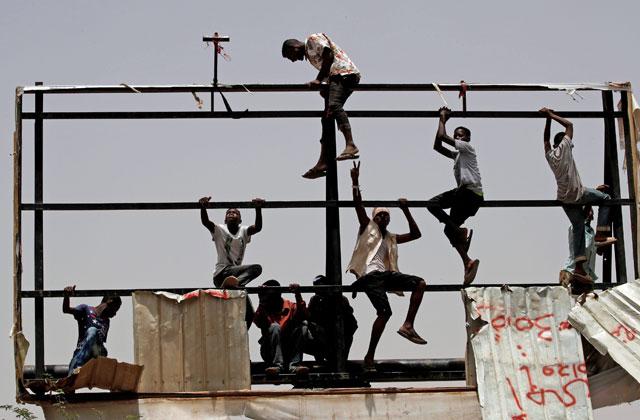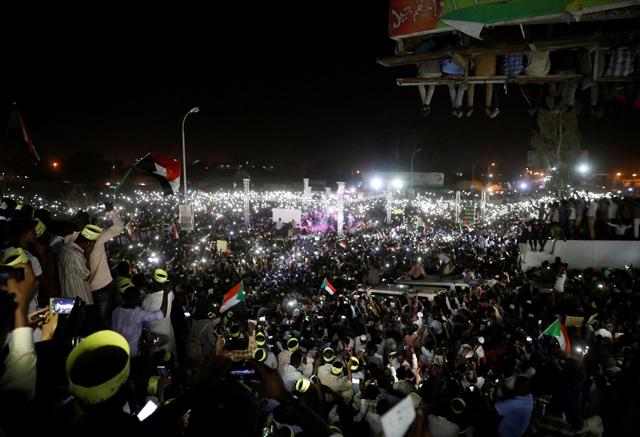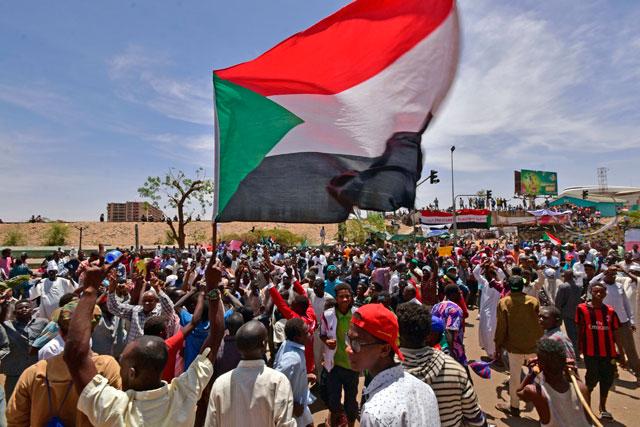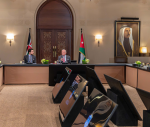You are here
Protesters throng Khartoum a week after Bashir ouster
By AFP - Apr 18,2019 - Last updated at Apr 18,2019

Protesters climb an old billboard frame during a demonstration in front of the Defence Ministry in Khartoum, Sudan, on Thursday (Reuters photo)
KHARTOUM — Protesters thronged the Sudanese capital Khartoum Thursday to mark one week since the army ousted president Omar Al Bashir, determined to complete their revolution seeking civilian rule.
On April 11, the army brought Bashir's three-decade rule to an end as tens of thousands of protesters camped outside the military headquarters in central Khartoum to demand its backing.
But protesters have vowed to keep up the pressure, calling for a civilian government to replace the military council that took Bashir's place.
"We are sending a message that we are not leaving this area until we achieve our goal," said protester Ahmed, who had been at the rally since early Thursday morning.
"The idea is to keep the fire burning."
Bashir, who took power in an Islamist-backed coup in 1989, headed a brutal regime that saw conflicts across the country, the secession of South Sudan and regular arrests of opposition leaders, activists and journalists.
Protests broke out on December 19 in response to the tripling of bread prices, swiftly turning into nationwide rallies against Bashir.
Cities, towns and villages echoed with chants of “freedom, peace, justice,” and “just fall, that’s all”.
The 75-year-old faces charges from the International Criminal Court of genocide, war crimes and crimes against humanity relating to the conflict in Darfur.
But despite detaining him, the military has resisted sending him to The Hague, saying his handover is a matter for a future civilian government it has pledged to deliver.
On Tuesday night, he was moved to the capital’s Kober prison, a family source told AFP.
Seven days on from his ouster, the huge square outside army headquarters reverberated with demonstrators singing, dancing and demanding the dissolution of the military council.
Thousands thronged the area, including teachers who carried pictures of their colleague Ahmed Al Kheir, who died in custody in January after being arrested in connection with protests.
He was one of more than 60 people killed before Bashir finally left office.
“We want the killers of our teacher friend to face justice,” they chanted.
Hundreds more people marched in from the northern suburb of Bahari, carrying banners reading: “Bring Bashir to justice”.
They were expected to be joined by women’s groups, trade unionists, engineers and students.
“Bashir’s regime was a terrorist regime, a dictatorship. We are happy that we overthrew him,” said protester Mohamed Ali.
“All these decades, we have had wars inside the country. Our relations with the world also suffered under Bashir. All that has to change, that’s what this revolution is for.”
Bashir’s defence minister General Awad Ibn Ouf initially took power as council chairman, but stepped down within 24 hours following intense pressure from protesters.
The council is now headed by General Abdel Fattah Al Burhan, a career soldier largely unknown outside of the army.
Protest leaders say they asked for a joint military-civilian council, but what they got was a military council with many regime faces.
They have now hardened their demands.
“We want the military council to be dissolved and replaced by a civilian council having representatives of the army,” said Mohamed Naji, a senior leader of the Sudanese Professionals Association which spearheaded the movement.
This civilian council should then make way for a four-year transitional government, protest organisers say.
“It is increasingly clear that the revolution is still unfinished,” said International Crisis Group analyst Alan Boswell.
“The security cabal which still has power in Sudan is clearly resisting demands that would force it to cede its own power.”
The protesters did win the resignation of Saleh Ghosh, head of the feared National Intelligence and Security Service.
He oversaw the crackdown on protesters that left dozens dead, hundreds wounded and thousands jailed.
But as pressure grows from world powers and the Sudanese street, all eyes are the military council’s next move.
“I don’t think we are anywhere close to the end of the road yet,” Boswell said.
“We are hitting pretty dangerous waters”.
The military council has offered concessions, including sacking the prosecutor general.
But both Western and African governments have pushed for greater change.
The United States, United Kingdom and Norway urged the military council to hold an “inclusive dialogue” to usher in civilian rule.
The 55-member African Union on Monday threatened to suspend Sudan if the military fails to cede power to civilians within 15 days.
“A military-led transition would be completely contrary to the aspirations of the people of Sudan,” the bloc said.
Protester Erij Salah, 23, said Bashir’s departure was important but further change was needed.
“We have to fight until we get rid of this regime.”
But engineer Tariq Ahmed, 28, said he was already “proud of what my generation has done to the dictator”.
“This is the first week in my life that I have lived without Bashir,” he said.
Related Articles
KHARTOUM — The first US ambassador to Sudan in 25 years took up his post on Wednesday in the latest easing of ties since Washington removed
KHARTOUM — Sudan's military leader vowed Sunday he was committed to handing power to the people, as a sea of protesters outside army headqua
KHARTOUM — Sudanese protesters demanded new military rulers set up a civilian government as the foreign ministry called Sunday for backing f














